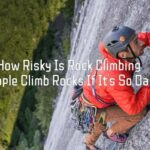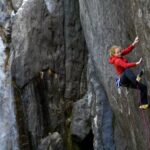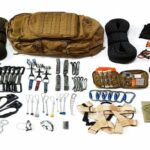Interview With Angie Payne: We’ve had a crush on Angie Payne ever since we watched her graceful power at The 2012 Dark Horse Comp. A climbing force inside and out, Angie has claimed the FFA of 30 boulder problems V9 and harder, not to mention being the first woman in the world to climb V13. Recently at The Heist, we had the opportunity to briefly interview her and were struck by her down-to-earth, thoughtful responses. Payne talked about the inspiration she finds in the everyday climber, the “weekend warrior”, who finds a way to balance life responsibilities with hard climbing.
Check out Q&A With Ecuadorian Climber Andrea Castillo
We had the privilege of sitting down with Angie Payne to pick her brain about climbing, balance, perspective, and colonoscopies. Although Angie would humbly disagree, in talking with her, we’re pretty sure that she has figured out the secret to the climbing life. Be prepared to be enlightened: 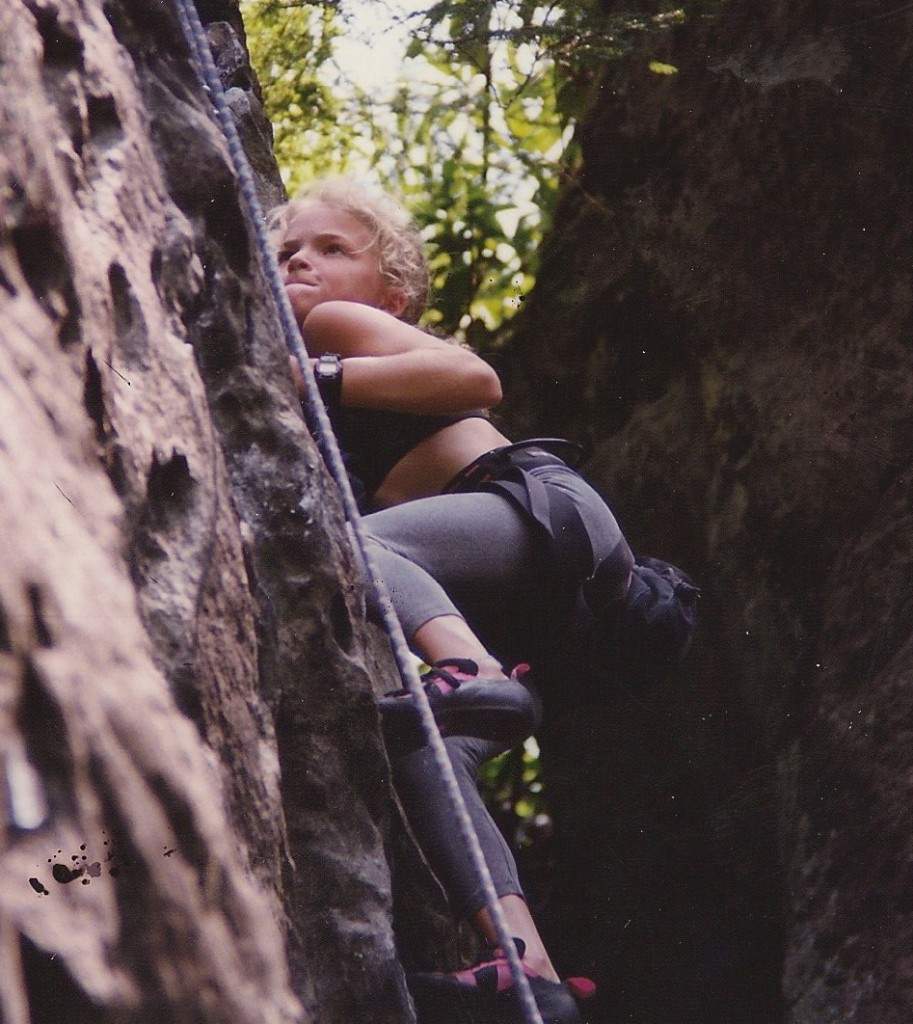
Little Angie crushing it in the Red River Gorge circa 1996
CXC: You’ve been climbing since you were 11, much of it in junior sport climbing competition, yet have managed to not get burnt out on climbing, while also intensifying your climbing. How have you been able to do this?
AP: I guess this is something I’m proud of because it’s been such a struggle. I didn’t really think it would turn into this – ever. By the time I was 15, I thought I was done with climbing. I was really sick of competing, and I guess it was right around when I turned 16, that I decided I was going to go out on my own instead of climbing ropes with my dad all the time. I was going to go to the bouldering gym and I never went to the bouldering gym – I was horrible at bouldering.
But I think that just switching it up, and doing something different, and doing it for myself, was just the thing that reinvigorated me and made me realize, ‘Oh, this is actually kind of fun even though I’m really horrible at it.’ Switching it up saved me and then I sort of started to fall in love with bouldering…then got into competitions, and then I started to get burnt out on those, so I started climbing outside. So basically every time that I’ve gotten burnt out I’ve thrown something else into the equation. And I think that is probably how I’ve managed to not walk away from climbing.
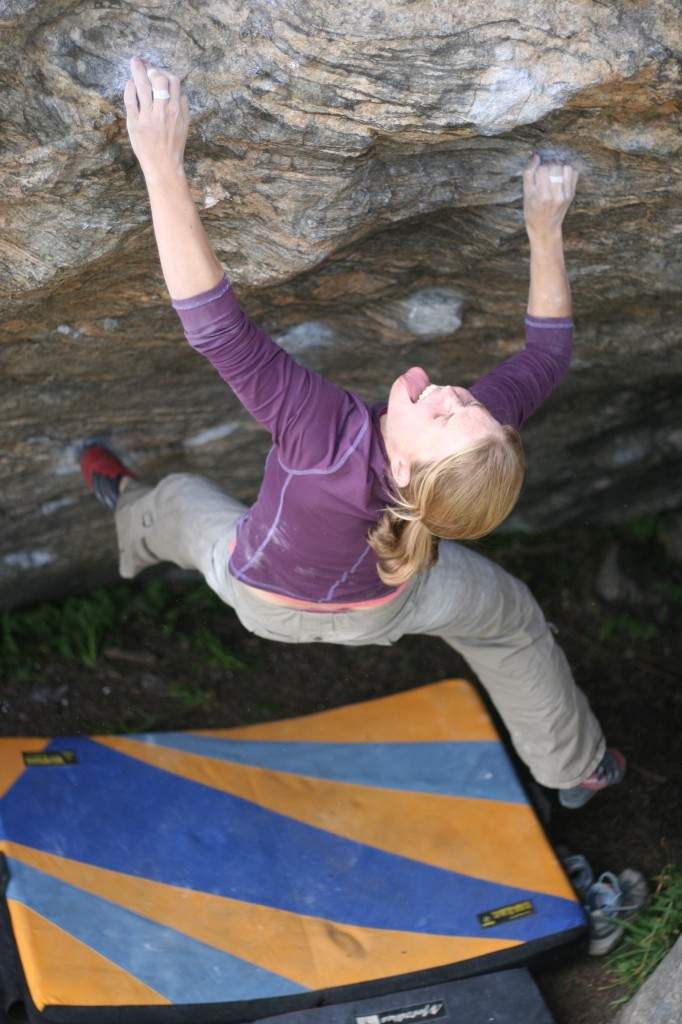
Keeping a sense of humor while trying incredibly hard, on European Human Being (V12)
CXC: Despite all of your success and accomplishments, you’ve somehow remained really grounded, not entirely swept up in the pro-climbing world. Is this on purpose, accidental, or something else?
AP: I think it was kind of a mix of both. Being from the Midwest has a lot to do with it honestly. It’s always been a real struggle for me to promote myself as a pro climber. It just doesn’t come naturally and it feels really forced to me to have to talk about what I’ve done and have to advertise that to people.
I’ve been thinking about this a lot lately because I’m sort of at a crossroads in my life, again, (I feel like I’m always at a crossroads), because I’m leaving the job that I’m at [as a tech for a gastroenterologist] and I’m trying to decide where I’m going.
I think that when I was growing up climbing was never, for better or worse, an option for a career path. I have had some opportunities where I could’ve done that but I’ve tried it out for a little bit and it’s really hard for me to just climb all the time. I don’t know, I take it too seriously, I get really burnt out really quickly, I push myself too much, I’m too hard on myself. It’s just really hard for me to only have climbing because I lose motivation immediately.
“I can’t just be a climber who climbs all the time ‘cause that kind of drives me crazy. I have to have something else – I’m just trying to figure out what that something else is…But, I do know that I don’t want to help with colonoscopies for the rest of my life – at least I figured that out!”
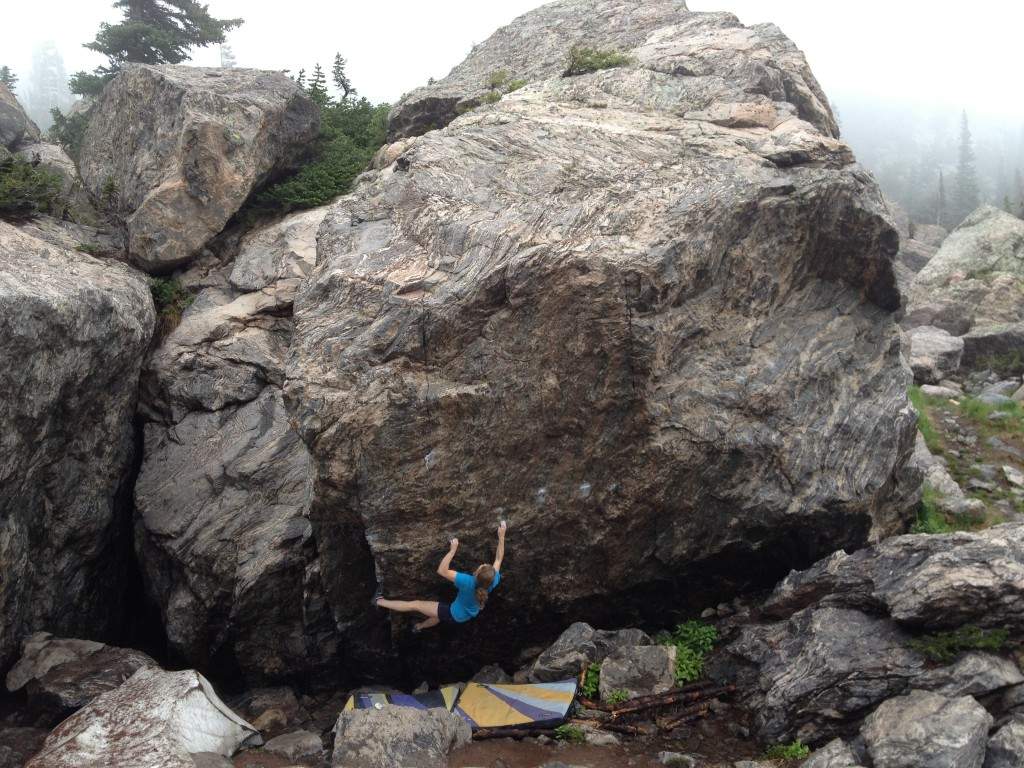
Angie putting in the days on Freaks of the Industry (V13/14)
CXC: You wrote on your blog, “I spent a lot of time lying on my crashpad looking up at the stars, and somewhere between fits of anger and self-doubt, I realized that the activity that was causing my frustration had also brought me to this serene place.” How do you moderate completely throwing yourself at a project with the inherent frustration that comes with projecting something at your limit?
AP: It’s really, really hard. I love it, I’m totally in love with it but it’s the biggest struggle. You’re walking into it knowing that you have to deal with frustration. That’s the whole point of it – to push yourself further, right? I’ve learned that I have to walk up to it with the right mentality. Always remind me that it’s hard and it should be hard if it’s at my limit, and I’m going to have to try hard. It’s not going to be this beautiful, perfect process – it’s not always going to be pretty and it’s not always going to feel right.
But that gets really hard when you spend 30 or 40 days at the same boulder problem and I’ve done that, so I have to look for really small steps of progress. It’s like little, teeny, tiny things become really big motivation factors. Like after day 40 when you still haven’t done the boulder problem and you have to walk away, you have to have something to hold onto. So I guess that’s how I balance it, is just to remember it’s going to be hard and there will always be progress until the very end.
“If I’m doing well in one arena, I’m probably doing better in climbing too because I’m not always obsessing about it.”
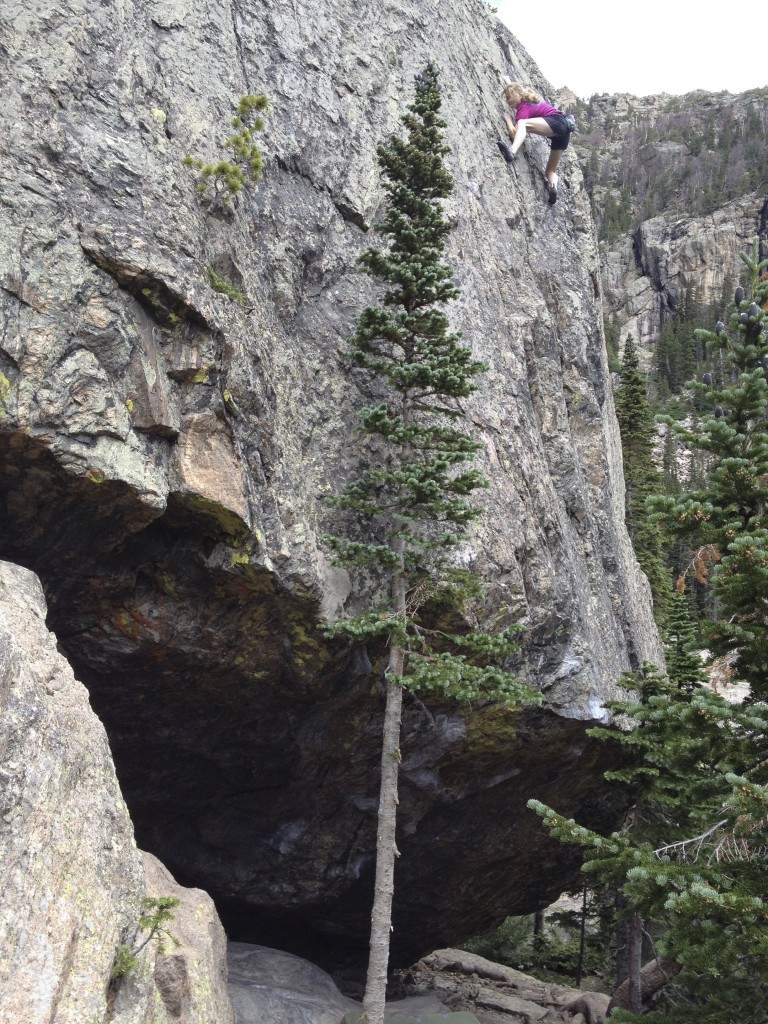
Whispers of Wisdom, RMNP. Photo credit: Meagan Martin.
CXC: What kind of climbers are you most psyched to climb with?
AP: I think that I’m drawn to the people who remind me of the climbers I grew up with. The climbers I grew up in Ohio – were amazing! Everyone made fun of each other, it was always super entertaining, and if anybody got a little too cocky, they would be made fun of. You can’t take yourself too seriously in that environment. You all try hard and everyone really loved climbing and they were all really serious about showing up and trying hard and that’s just the mentality.
It’s like if you’re going to do it, you better try hard. But, at the same time, they weren’t so serious that they thought this was the most important thing in the world, like “Here we are climbing and we have to do our projects and this is it.”
There’s just such a humility about those people I grew up with that’s who I’m attracted to now. Anybody who reminds me of that small, little, dirty gym that I grew up climbing in with that little crew of 5 or 6 different people that I always climbed with. Those are the people that I really enjoy climbing with. They can have fun, they always really give it their all, but they don’t let it consume them.
CXC: Ya, cause at the end of the day, it’s all pretty silly. You’re like, “Why am I doing this? I’m wrestling this giant boulder? In this awkward position? What is happening?”
AP: Exactly. I’ve gotten on the same boulder problem for 50 days [Freaks of the Industry, V13/14] and I can’t tell you how many times I’ve looked at it and been like, ‘Really?! This is a piece of rock and I’ve just been here for 50 days sitting here, throwing myself at this thing.’ And that’s when I have to keep it all in perspective. I love being there and that’s why I’m there, and it’s not going to change the world.
I know that. In the grand scheme of things, one boulder problem is not going to change my life. If you have the mentality that most climbers do and you’re attracted to the sport, you’re not going to find satisfaction in completing just one single thing. That’s why climbing is amazing – because there’s always going to be another one and then another one and then another one.

Angie having a good day outside, one of her last days on Freaks of the Industry this year.
CXC: What makes it a really good day outside for you?
AP: Well, just being outside at all makes it a pretty good day. I’ve really realized, especially since moving to Colorado, that just being outside is a lot more important than I ever thought and I think being inside a lot for my job has really put that in perspective. I think that if I feel like I really put in my best effort, that usually makes it a good day. Usually, if I laugh with my friends, that’s a pretty good day.
I love finishing things that I’ve been working on – that’s a really good feeling, so that can definitely make it a good day but I’ve had so many days, especially now that I’ve been projecting Freaks, where I haven’t really done that many things and just being outside with a couple of people I really like and climbing, makes it a good day. If I get to climb and move, that’s usually a good day, even if it is in the gym. I am a gym rat at heart, and I truly do love gym climbing.
I have a special place in my heart for plastic climbing, and always will. I just like the movement, pushing myself, and being frustrated.
CXC: You’ve called “Freaks”, your current project, “one of the most epic and emotionally-taxing endeavors of my bouldering career.” At the same time, you’ve said that you “truly love the process.” What are the essential components of “the process”? Where are you at in that process? Has the process changed for you over time?
AP: The first part of the process is walking up to whatever you’re going to try and having it feel really, really hard, and knowing that’s okay. But where it really begins is once you realize that it’s possible and you can do it. For me, that’s kind of when it begins, and that’s a pretty cool moment when something that seems impossible becomes possible. Like when I first moved [to Boulder, Colorado], I was 19 and I tried this boulder problem, European Human Being [V12], and I couldn’t really do any of the moves on it, and then a couple of years later, I tried it again and I think I did one of the moves.
Then the year that I finally did all of the moves was probably one of my first projecting experiences, where I really tried this thing a lot and it was such a cool moment of, ‘Oh my gosh, I can do these moves! And so if I can do the moves, I can link the moves and if I can link the moves, I can do the boulder problem!’ So I think that’s when I really became hooked on it.
Another huge part of the process is just putting in the days. You have to always be willing to go back. Then the other part is what I said before, making tiny little steps toward the ultimate goal. Keeping it in perspective that you’re not always going to have an amazing day but once you know that you can do it, any day can be the day that you do it, so there’s always that hope. And when I’m really frustrated, I stop and I’m like, ‘Oh, well it’s really pretty here, so that’s nice and at least I’m not doing a colonoscopy right now!’

Angie Payne, keeping it all in perspective, late in the season at RMNP
CXC: For sure! Nothing like a colonoscopy to put it all in perspective! So, when you get to the point where you know you can do the moves and link sections, and you’re like, ‘Ok, today could be the day that this goes,’ how do you deal with knowing that and then it not going, again and again?
AP: It’s such a psychological battle. I learn a lot about myself in the process because I have to have that fight with myself every day in my head. Knowing that I can do it but also knowing that there’s going to be days when I’m just climbing poorly, or it’s really hot so it feels a lot harder, or I’m just not trying hard enough. It’s a battle, it is. This is a different level that I’ve never been to with projecting [Freaks of the Industry].
If you focus too much on knowing you can do it – for me, I don’t try as hard. I think about doing it too much and not about the actual movements and doing it correctly.
I’m like, ‘Oh, I could do it this time. So I should just do it now!’ And I become so focused on that that I forget to try hard. That sounds so dumb, but it’s true. I pull on and I get really excited knowing that I could do it and I get distracted.
Sometimes the best thing to do is just to walk away for a while and be like, ‘Okay, I need to come back to this and have it feel a little bit harder, or like I don’t have it as memorized so that I don’t fall back into the routine of just not trying hard.’ It’s crazy, but I love it. That’s crazy to love something like that, but I do.
CXC: Thank you so much, Angie!
The above interview is a shortened, edited version of our hour-long interview with Angie. Read the full interview with additional photos here, including more about Angie’s thoughts on her climbing journey, balance, stress, and her plans for her future.

